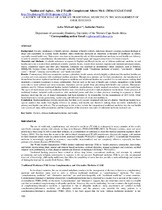A review of the role of African traditional medicine in the management of oral diseases
Abstract
BACKGROUND: Poverty, inadequacy of health services, shortage of health workers, infectious diseases scourges, rampant shortage of
drugs and equipment in existing health facilities make traditional medicine an important component of healthcare in Africa,
especially in oral health care. This review was done to document the role of African traditional medicine in oral health care delivery
in order to provide a comprehensive documentation, identify research gaps, and suggest perspectives for future research.
MATERIALS AND METHODS: Available references or reports in English and French on the use of African traditional medicine in oral
health care were consulted from published scientific journals, books, reports from national, regional and international organizations,
theses, conference papers and other grey materials. Literature was searched on international online databases such as Pubmed,
MEDLINE, Science Direct, Scopus and Google using the MeSH words “Traditional medicine or healer”, “oral health”, “dental
caries”, “dental”, “primary oral health care’ and “medicinal plants”.
RESULTS: Contemporary African communities operate a pluralistic health system whereby highly sophisticated biomedical health care
co-exists and even competes with traditional medical practices. Though most patients opt for dual consultations, the introduction of
biomedicine has never replaced traditional indigenous medicine and traditional healers are consulted for several reasons making dual
treatment a common occurrence in many communities. Factors such as the lack of health care workers, inequalities in the health
sector due to socio-cultural and socio-economic disparities prevent people from patronising both health care systems. Therapeutic
methods used by African traditional healers include herbalism, psychotherapy, simple surgical procedures, rituals and symbolism.
The types of medications used by traditional healers were classified as preventive and prophylactic medications. Some practices of
traditional healers included tooth extractions with medicinal plants and also in other practices resulting in exposure to blood;
practices involving the use of shared instruments had been reported to be responsible for the transmission of HIV/AIDS. Other
harmful practices include gemectomy, uvulectomy and different forms of infant oral mutilations.
CONCLUSION: Traditional healers provide dental care, but their work was not integrated with that of a dentist. Traditional healers have
special qualities that make them highly effective in primary oral health care therefore making them inevitable stakeholders in
primary oral health care delivery. The research gaps in this review include the integration of traditional medicine into the oral health
care systems of many African countries and the evaluation of the treatment outcomes of traditional medicine in dental care.

